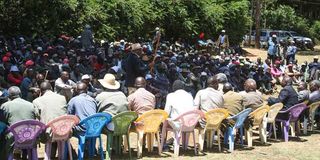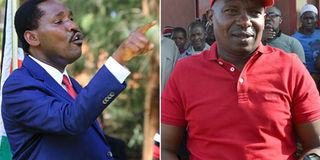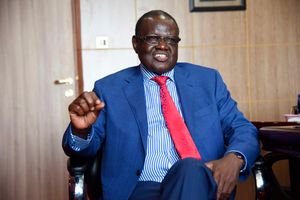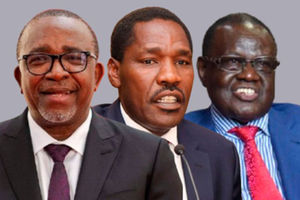
Meru community’s Njuri Ncheke Council of Elders in session at Maili Tatu, near Maua Town in 2017.
The Njuri Ncheke Council of Elders, long revered among the Ameru community for its role in resolving complex civil disputes, is now embroiled in leadership wrangles that have paralysed its operations and eroded public confidence.
Ironically for over a decade, the council whose word has traditionally settled matters too convoluted for the courts has increasingly turned to judicial processes, political figures and State institutions to resolve its own internal conflicts.
What was once a cultural pillar of smooth, consensus driven leadership transitions is now fractured by power struggles, political interference and competing interpretations of tradition versus modern governance.
For the past 10 months, the council’s legally recognised leaders including Chairman Linus Kathera, secretaries Josphat Murangiri (operations) and Washington Muthamia (programmes) have been locked out of Njuri Ncheke shrine headquarters in Nchiru, Tigania West.
A different faction led by Adrian Aruyaru seized control in August 2023, declaring Mr Kathera’s team “unclean” and unfit to lead citing internal disciplinary protocols.
In response, Mr Kathera's camp has dismissed the move as unlawful, branding Mr Aruyaru an imposter with neither legal nor cultural legitimacy.
The current impasse mirrors a 2015 split when the late Paul M’Ethingia was ousted from leadership.
That coup backed by former Meru Governor Peter Munya stemmed from political rivalries with then Tharaka Nithi Senator Kithure Kindiki who is now the deputy president.

Former Agriculture Cabinet Secretary Peter Munya and Deputy President Kithure Kindiki.
This follows Mr M’Ethingia’s endorsement of Prof Kindiki as the Ameru spokesperson and prospective deputy president.
After ousting M’Ethingia, Mr Kathera and Mr Murangiri were installed in 2015 with their leadership later formalisd through a court mediated agreement that merged factions.
Now, it appears the same tactics used to oust the previous leadership are being turned against Mr Kathera’s team with Mr Aruyaru borrowing heavily from the same playbook.
The latest cracks began to show in October 2023 after the council publicly endorsed the impeachment of then Governor Kawira Mwangaza.
"Violation of tradition"
During a contentious gathering at the Nchiru shrine, the elders offered blessings to current Governor Isaac Mutuma to succeed her, an act Mr Aruyaru condemned as a violation of the council’s tradition of remaining apolitical and working with the government of the day.
“The statement by Secretary General Josphat Murangiri that Njuri Ncheke supports the impeachment did not come from us. The meeting was not properly constituted as it included women and children contrary to our operating procedures,” Mr Aruyaru said at the time.
Mr Aruyaru went on to testify in support of Governor Mwangaza during her Senate impeachment hearings.
His faction formalised its takeover in August 2023 electing Mr Aruyaru as chairman and Mr Solomon Kinyua as secretary-general.
They argue that Mr Kathera’s term expired in August based on Njuri Ncheke’s traditional 10-year age-based leadership rotation.
According to Mr Aruyaru, Njuri Ncheke is governed by the unwritten rules set by its founder Kaura o Becau which dictate that leadership must rotate every 10 years according to age groups.
The current leaders belong to the ‘Lubetaa’ age group which he claims is due to hand over to the younger ‘Miriti’ group.
The leaders we are opposed to took office in 2015 and they belong to the ‘Lubetaa’ age group. They have no business being in office,” Mr Aruyaru argues.
“Njuri Ncheke operates on the Ntwiko system. The Lubetaa group, now over 70 years old must pass the baton. These rules cannot be written down. They are passed through oral tradition,” Mr Aruyaru further explained.
He further dismisses the current constitution registered under the Societies Act as a document drafted without the input of the broader council membership.
But Mr Kathera insists that the council operates under both cultural and legal frameworks and that his leadership is valid until 2028 as set out in the 2015 court sanctioned agreement.

Kirinyaga Governor Anne Waiguru speaks to journalists on May 8, 2021 after a meeting with Kirinyaga and Njuri Ncheke elders in Sagana.
“Our constitution provides a 10-year term and we were formally installed in 2015. We will serve until 2028. Once the time comes, all elders will sit down and appoint their preferred leader. Anyone talking about any other term is clueless. I will be in office until my term expires,” Mr Kathera said.
He hinted that the next leader could come from Tharaka Nithi County in a bid to ensure regional balance within the council.
Elders loyal to Mr Kathera have rejected the legitimacy of Mr Aruyaru’s group. North Imenti Njuri Ncheke chairman Stephen Mworia accused Mr Kinyua who is the splinter faction’s secretary general of failing to follow protocol.
“As North Imenti elders, we only recognise Linus Kathera, Josphat Murangiri and Washington Muthamia as our leaders. The rest, including Mr Kinyua who hails from my village are imposters. A legitimate leader must first be endorsed by their local shrine,” Mr Mworia declared.
As tensions continue to escalate, leaders from both sides have resorted to issuing threats and warnings, further stalling efforts at reconciliation.
Attempts to bring the factions to the negotiating table have so far failed.







